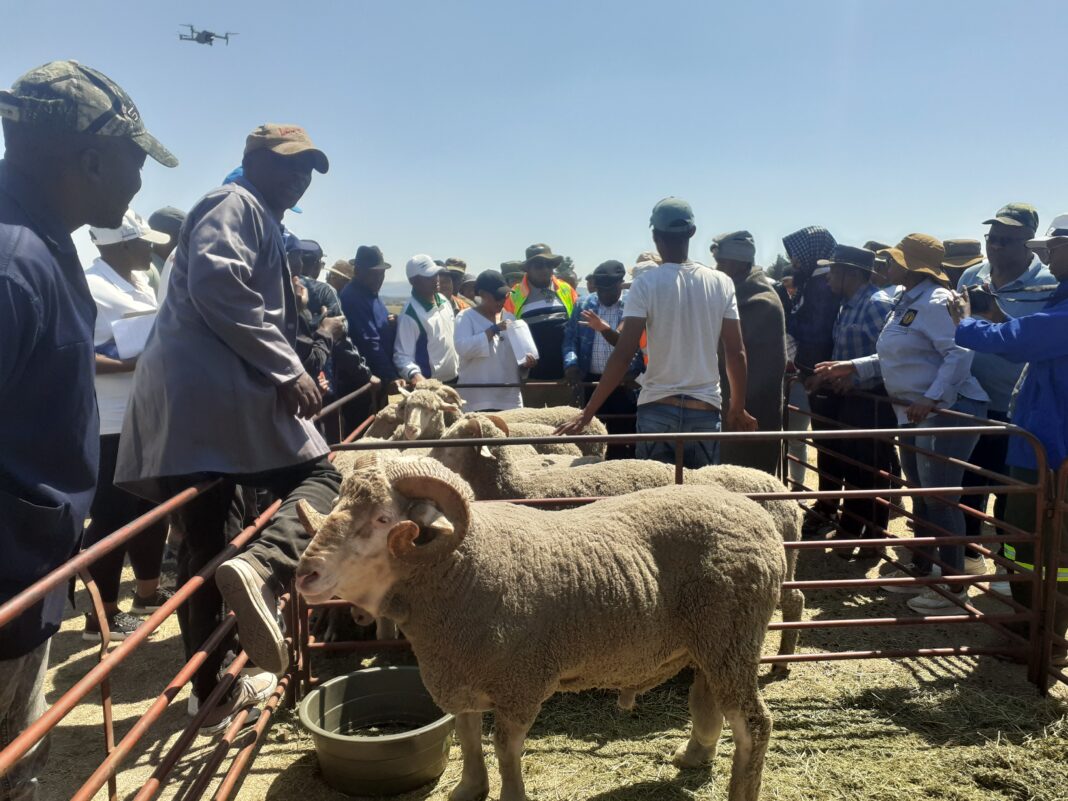… as Makhetloane pins hope on modern sheep breeding
Kabelo Masoabi
Decades of being stereotyped to the natural method of breeding sheep is failing a Leribe shepherd Matela Makhetloane.
His flock can no longer produce the quality fleece desired for the wool market, as his main business model is to sell the flock’s wool during the shearing season.
Wool and mohair form the bedrock of Lesotho’s rural economy. Producers range from smallholder farmers with small flocks to breeders of large flocks of superior gene-quality animals.
With over 1.2 million sheep, wool production is the leading commodity exported by Lesotho and mohair is the fifth largest.
On average, one sheep yields almost three kilos of wool.
Makhetloane shares that over time his income has significantly slumped, mounting undesired pressure to produce more rich and weighty wool for the market.
The Ha Seetsa sheep breeder reveals he is working on a strategy to adopt breeding technologies to achieve a huge turnaround in his business.
“I am receiving all new information from the government’s agriculture extension officers; about various forms of breeding and their benefits. That has helped me rethink my vision. I am on a path to becoming a competitive wool producer and seller in the country. I am now rearing special Merino sheep,” Makhethoane said.
His vision was amplified this month when he was one of the recipients of matured sheep under the Prime Minister’s Office Poverty Reduction Programme.
The Premierer’s office donated units of Merino wool rams and ewes to 108 shepherds from the districts of Berea, Leribe and Botha-Bothe districts.
Each beneficiary received a unit of 10 ewes and 1 ram.
“Sheep farming business commercially is the most popular and profitable business. It is guaranteed that the return on investment was handsome and within a short space of time.
“Livestock extension officers teach us that we can use sophisticated breeding systems to improve our wool production and with the tools needed to improve my production, I intend on turning things around. This livestock is matured and you can tell that with good handling, the yield will be a big one,” he said.
The unit will add up to the five traditional sheep the herder currently owns.
The 38-year-old herder and a father to two children revealed he had been rearing animals mainly to feed his family because he had lost hope in the wool business.
He indicated that his fleet had since decreased due to animals dying and family consumption.
“This time things are going to change. I am going to keep the Merino sheep and breed them while selling their quality wool. I’ll then utilise the profits to take care of my family. Honestly, there are just many challenges in rearing traditional sheep while with the Merino brand, it is feasible to achieve success. I already training and assistance to help me get it right this time around,” he said.
Makhetloane is the only beneficiary of the donation from the village of Ha Seetsa. That means he is now facing the enormous task and opportunity of reproducing the Merino brand for fellow farmers in his community.
According to a renowned farmer, Tumahole Lerafa, worldwide farmers breed animals for increased production, disease resistance, successful reproduction, and resilience to climate stresses, most often heat and drought.
He indicated that highly productive animals use a greater portion of their nutritional intake to produce desired goods such as milk or meat as opposed to simply maintaining their bodies.
Lerafa, the executive member of the Khosana Lerotholi Breed Farmers Association was speaking at the Prime Minister’s ceremony.
He said the purpose of livestock breeding is to produce animals with traits which are different from those of animals now available to farmers for the production of livestock products.
“…in particular, the livestock breeder is attempting to provide animals which improve the efficiency of converting inputs to outputs. Specifically, the purpose may be to increase body growth, milk production or wool production.
“Improving the quality of your sheep, your flock increases its value and efficiency. Breeds are more productive, marketable and better breeders themselves,” Lerafa said.
On behalf of Prime Minister Ntsoakoane Matekane, Deputy Prime Minister Nthomeng Majara viewed the investment support as the beginning of an entirely new journey for local livestock farmers.
Majara revealed that the government has spent M4 million to purchase 1080 Merino wool sheep under the programme, saying beneficiaries are shepherds from the rural areas of Berea, Leribe and Butha-Buthe districts.
“The beneficiaries were identified by their communities through a ruffle process,” the DPM explained.
Majara announced that out of the 1080 sheep bought, 152 were sourced in Lesotho.
“This means an estimated at M700 000. 00 was pocketed by Basotho farmers while the rest of the flock was procured from neighbouring South Africa.
“It is expected that the shepherds who benefited today will continue with the breeding of these sheep and in three years from now, they can be able to sell to the government under the same program,” Majara motivated.
Since its inception in 2018, the DPM said the programme has assisted livestock farmers in Mokhotlong, Thaba-Tseka, Maseru, and Quthing and next year the same donations will cover deserving herders in Mafeteng and some parts of Mohale’s Hoek.
The Butha-Buthe District Administrator Tšepa Chaba appealed to the beneficiaries to protect the sheep, maintain their good health and work together with security agents to fight livestock theft. He said the extension officers must as well perform their duty of ensuring that the flock is reared correctly.




